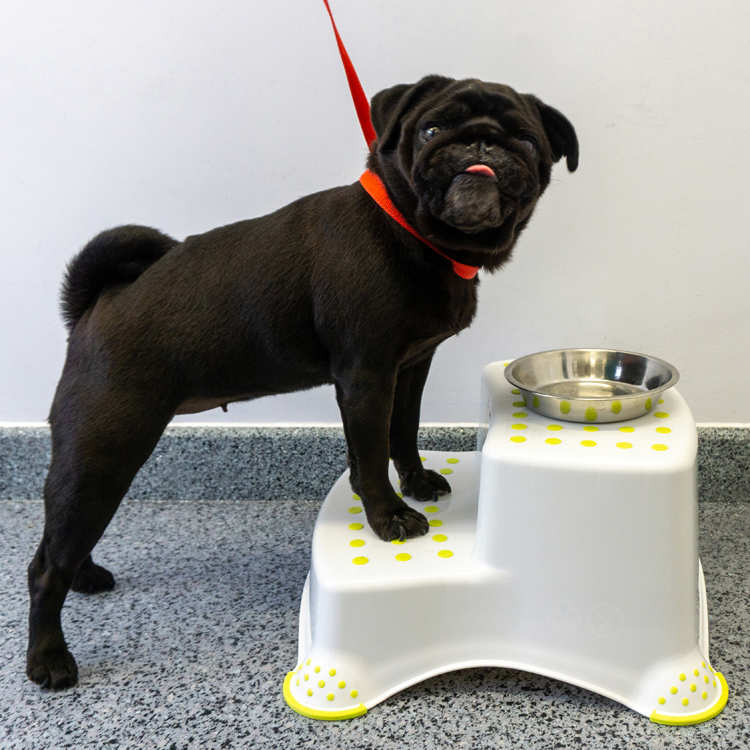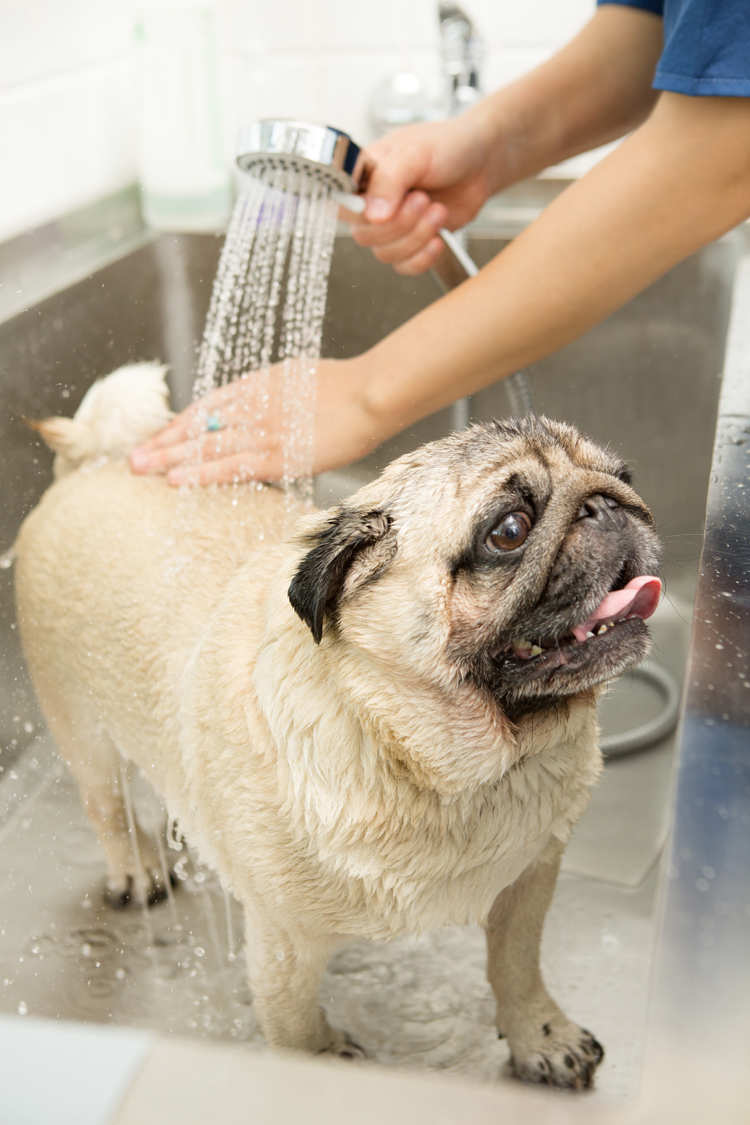Brachycephalic Obstructive Airway Syndrome
Brachycephalic breeds have excessive soft tissues in their nose and throat which obstruct their breathing, this reduces their ability to exercise or cope in hot weather.
They also have problems with reflux or regurgitation, which can worsen their ability to breathe.
We recommend that brachycephalic patients should be managed, as outlined below, prior to surgery, as this should improve the safety of the anaesthetic.
Please involve all family members and carers with these management strategies.
Management Instructions - Feeding
1. Hypoallergenic diet
- A very bland diet is necessary for BOAS patients as a varied diet can worsen reflux.
- No human foods, table scraps, milk, chews, treats etc. If you wish to reward your dog, a single piece of their own hypoallergenic kibble food can be given.
- Veterinary prescription diets are very good and you can discuss these with your vet, they tend to be expensive for life-long use.
- A good brand of commercially available hypoallergenic diet, bought from a good pet store, is good enough for most brachycephalics and will be cheaper.
- A fish-based diet tends to work best, but you may need to trial different ones as each dog is an individual and what works for one may not work for another.
- Many brachycephalic dogs have a sensitivity to chicken, try to avoid this flavour.
- Dietary changes should be made slowly over about a week, gradually feeding more of the new diet and less of the old.
- Please accurately weigh out food portions, feed the lower end of the recommended amount and remember to reduce the volume in the summer months, when exercise tolerance will be lower.
2. Kibble
- A kibble food is fine, but this should be soaked in water before feeding, and should be the consistency of tinned food when cut with a knife.
- Pouring on boiling water and allowing to cool for half an hour works well, or soak in cold water overnight.
3. Feeding smaller meals
Providing food little and often can also be beneficial to help with reflux and regurgitation, e.g. three or four smaller meals instead of feeding once or twice daily. A small meal before bed can sometimes help dogs who suffer with acid reflux in the early morning.
4. Feed slowly
A ‘slow feed’ bowl or lick mat is useful. You could also slowly hand feed, but this is very time consuming.
6. Elevate afterwards
They should be stood up on their back legs for two to five minutes after eating; alternatively, they can be held upright for the same amount of time, rather like winding a baby. If you can, it may be beneficial to hold them like this as other times of the day as well.
7. Antacid medication
We use these before and after any surgery. Some dogs require these intermittently or continuously for life, but the ‘natural’ remedies outlined above, if performed properly and regularly, should reduce the reliance on medication.
Rarely some dogs may have a reaction to medication – please let us know if symptoms worsen and we can alter the medication.
General Mangement
2. Avoid excessive exercise
- Unfortunately it is unrealistic to expect any brachycephalic dog to exercise as well as a Labrador, although some can get pretty close!
- Control excessive exercise including play, to prevent raspy panting.
3. Keep very, very slim
The ribs should be palpable with the last rib visible in brachycephalic dogs. They will always breathe better if slimmer. To monitor weight loss please weigh on scales every two weeks and keep a progress record. If weight loss is not achieved in the two week period, reduce food volume further and continue to monitor progress.
4. Avoid smoke
All smoking or vaping indoors should be avoided in the household; even one cigarette in the house, even in a different room or near a window, is enough to worsen their problem.
5. General health
Keep up to date with your pets vaccinations and ensure they are wormed effectively for lungworm (check with your own vet).
6. Stressful events
These can cause a ‘flare up’ of signs of reflux (and also of general brachycephalic breathing problems).
Examples of these type of events are:
- Long car journeys.
- Staying at boarding kennels or away from home.
- Visits to the groomer or vet.
- Sedation or anaesthetics.
- Bringing a new animal or person into the home.
If these events are anticipated, it is often worth stepping up the management for two weeks before and three to four weeks after the event, and consider adding in antacid medication during this time as well. If already being used, the dose may be increased with guidance from your vet or additional medication can be used.




